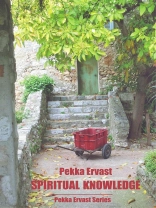In all times people have believed that human exists after death and that there is an invisible world. There have also been people who have sought and found answers about the purpose of existence, life after death and the spiritual realm.
Finnish writer Pekka Ervast describes the requirements for spiritual knowledge on the basis of Indian Vedanta philosophy and Christian occultism. In the first stage knowledge from the visible and invisible world is gained through the senses. In the second stage the truth seeker becomes self-aware in the invisible world. And finally in the third stage human becomes one with God – the spirit of Brahman, and gains the highest knowledge attainable.
The first chapters examine the purpose and structure of both the presently existing as well as the yet dormant senses of a human being. The following chapters examine the yoga practices of Patanjali and their influence on human constitution. And finally Ervast examines the life after death and the experiences which one faces on the spiritual path.
Pekka Ervast (1875-1934), Founder and General Secretary of the Finnish section of The Theosophical Society, Founder-President of the Finnish Rosicrucian Society, 33 degree founder-member of the Finnish section of the International Order of Freemasonry Le Droit Humain. Founder-President and Grand Master of the Finnish Rosicrucian Freemasonry.
Inhoudsopgave
Table of contents:
Human super-senses (lecture held 18.2.1917)
Occult knowledge (12.1.1919)
Creative knowledge (19.1.1919)
Skilled clairvoyance (29.5.1924)
The spiritual constitution of man (7.12.1924)
Reincarnation and the path of liberation (14.12.1924)
The yoga meditation of Patanjali (18.1.1925)
The attainments of a yogi (25.1.1925)
The highest goal of a yogi (1.2.1925)
The requirements of spiritual knowledge (13.2.1927)
Beyond death (15.12.1929)
The after-world (22.12.1929)
Heaven (29.12.1929)
This book is a collection of lectures held by Pekka Ervast (1875-1934) in Helsinki, Finland, between 1917–1929 which cover human super-senses (extra sensory perception), clairvoyance, yoga meditation and spiritual knowledge which enable exploration of the afterlife. The lectures were written in shorthand and are not edited to a literary form, but the characteristic style of the speaker is retained.
Pekka Ervast was aware of the invisible world since his childhood and strived consciously to reach God. He had a spiritual experience at the age of 21 which made him an independent investigator of the invisible world. For the next 38 years his contribution was remarkable. He lectured weekly (at first especially in neighbouring Sweden), was the founder and General Secretary of the Finnish section of The Theosophical Society, Founder-President of the Finnish Rosicrucian Society, edited magazines Omatunto (“Conscience”), Tietäjä (“Sage’) and Ruusu-Risti (“Rosy Cross’).
Highlights from his remarkable literary work include clarifying the spiritual essence of the Finnish National epic Kalevala, work in the field of Christian occultism explaining the sermon on the mount and the five commandments of Jesus to seekers of truth, translating sacred texts of oriental religions into the Finnish language, and clarifying the inner path of Freemasonry. Ervast was the founder of the first masonic lodge in independent Finland, and a 33 degree founder-member of the Finnish section of the International Order of Freemasonry Le Droit Humain. He was also the Founder-President and Grand Master of the Finnish Rosicrucian Freemasonry.







![Hoes van Brian Schrag & Julisa Rowe: Community Arts for God's Purposes [Chinese] 貼近神心意的社群藝術 Hoes van Brian Schrag & Julisa Rowe: Community Arts for God's Purposes [Chinese] 貼近神心意的社群藝術](https://static.worldofdigitals.com/thumb_webp/740/9781645083740.webp)




